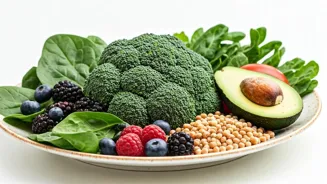Introduction: Dietary Changes
Type 2 diabetes management often involves medication and lifestyle adjustments, including dietary changes. Focusing on the correct foods may assist in naturally
reversing the effects of the disease. The consumption of specific foods affects blood sugar levels, playing a significant role in controlling and possibly reversing type 2 diabetes. This article will delve into seven foods that may aid in balancing insulin levels and promoting steady blood sugar.
Leafy Green Vegetables
Leafy green vegetables like spinach, kale, and collard greens are ideal options for those seeking to manage their blood sugar levels. These vegetables are low in carbohydrates and calories, providing a substantial quantity of vitamins, minerals, and fiber. Fiber slows the absorption of sugar into the bloodstream, which in turn avoids dangerous blood sugar spikes. Incorporating leafy greens into meals can substantially improve insulin sensitivity, thus aiding in the effective management of type 2 diabetes. Consuming these greens will benefit overall health because they are also packed with antioxidants that protect against cell damage.
Fatty Fish Consumption
Fatty fish, such as salmon, mackerel, and sardines, are rich in omega-3 fatty acids, crucial for managing type 2 diabetes. These fats are beneficial in reducing inflammation and improving insulin resistance. Regular consumption of fatty fish can enhance insulin sensitivity, which allows the body to utilize insulin more efficiently. Furthermore, the protein content in fatty fish helps maintain a steady blood sugar level, promoting satiety and preventing overeating. Including fatty fish in your diet can also boost heart health, as it reduces the risk of cardiovascular complications often associated with diabetes.
Fiber-Rich Foods
Fiber-rich foods, including whole grains, beans, and lentils, are instrumental in managing blood sugar and preventing spikes. Fiber slows down the digestion and absorption of carbohydrates, allowing for a gradual and controlled release of glucose into the bloodstream. This helps to keep blood sugar levels stable. Whole grains have a lower glycemic index (GI) than refined grains, which leads to a more controlled blood sugar response. Beans and lentils also provide a substantial amount of protein, which aids in balancing the effects of carbohydrates, offering sustained energy and reduced hunger. Incorporating these into your diet can lead to overall improvements in insulin sensitivity.
Avocados and Insulin
Avocados are a healthy source of monounsaturated fats, essential for improving insulin sensitivity. The healthy fats in avocados slow the absorption of sugar from meals, thus helping maintain more steady blood sugar levels. Avocados are also rich in fiber and nutrients, which enhance overall health. Including avocados in your diet assists with managing weight by providing a feeling of fullness and reducing the likelihood of overeating. Their versatility allows them to be easily integrated into various meals, providing a delicious and beneficial addition to any diet. The high nutrient content of avocados also benefits heart health.
Nuts and Seeds
Nuts and seeds are excellent additions to any diet for type 2 diabetes management. These provide a combination of healthy fats, fiber, and protein that work to stabilize blood sugar levels. They are low in carbohydrates, which means they cause only a slight increase in blood sugar levels compared to many other snack options. The combination of fiber, protein, and healthy fats aids in slower glucose absorption, avoiding blood sugar spikes. Regular consumption of nuts and seeds may enhance insulin sensitivity, reduce the risk of heart disease, and improve overall health. Enjoying a handful of nuts or seeds as a snack can easily fit into a healthy dietary plan.
Berries: Healthy Choice
Berries, such as blueberries, strawberries, and raspberries, are packed with antioxidants and have a lower glycemic index compared to many other fruits. This implies that they affect blood sugar levels slowly and steadily. The antioxidants in berries help to reduce inflammation and oxidative stress, which are often seen in individuals with type 2 diabetes. Berries are also rich in fiber, which promotes satiety and aids in blood sugar management by slowing glucose absorption. Incorporating berries into your diet offers a delicious way to enjoy a sweet treat while promoting health and well-being, especially when paired with other healthy options like Greek yogurt or nuts.
Yogurt (Plain)
Plain yogurt, particularly Greek yogurt, may be beneficial for people trying to reverse type 2 diabetes. It's an excellent source of protein, which has a significant impact on blood sugar regulation. Protein helps to slow the digestion of carbohydrates, reducing sugar spikes after meals. Yogurt also contains probiotics, which improve gut health and insulin sensitivity. When selecting yogurt, opt for plain, unsweetened varieties to avoid added sugars that can negatively affect blood sugar levels. Incorporating plain yogurt into your diet can offer a tasty and healthy option while supporting overall metabolic health. Remember, avoiding added sugars is crucial for optimal results.












